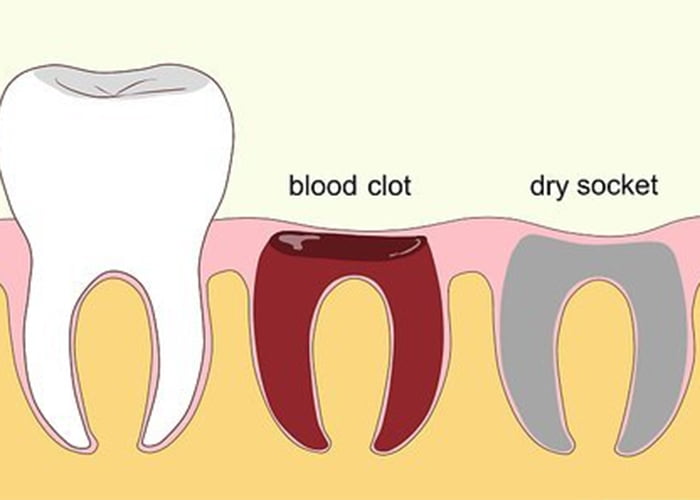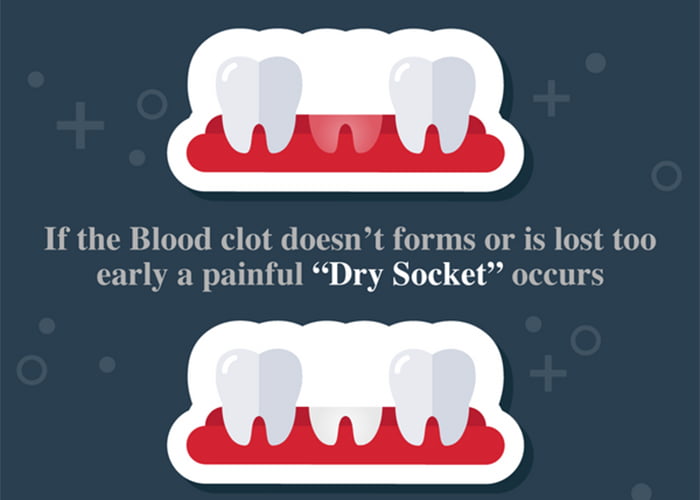Dry socket is a common complication after tooth extraction at the dental office. It occurs when the blood clot that forms in the socket after surgery is either dislodged or doesn’t form properly. This can cause severe pain and other symptoms. Treatment typically involves cleaning the socket and placing a medicated dressing.
What is a dry socket?
A dry socket is a condition that can occur after a tooth is extracted. When a tooth is pulled, a blood clot forms in the empty socket to protect the bone and nerve endings. A dry socket occurs when this blood clot becomes dislodged, exposing the bone and nerves. This can be extremely painful. Dry sockets usually occur within the first few days after an extraction, but can sometimes occur up to a week later.

There are several factors that can increase your risk of developing a dry socket, including:
- Smoking tobacco products, which can interfere with healing.
- Having an infection in your mouth at the time of extraction.
- Having had a previous dry socket.
- Having difficulty with dental extractions in the past.
- Taking certain medications, such as birth control pills or steroids.
Causes: What causes a dry socket?

A dry socket is a condition that can occur after a tooth is extracted. The socket, which is the hole in the bone where the tooth was removed, fails to heal properly. This can happen for a number of reasons.
One common cause is when the blood clot that forms in the socket after extraction is dislodged. This can happen if you smoke, drink from a straw, or brush your teeth too vigorously in the days following your extraction.
Dry socket can also occur if the initial extraction was particularly difficult. If the tooth was severely damaged or if it was impacted (stuck in the jawbone), there is a greater risk that the socket will not heal properly.
Dry socket is more common in smokers and people who have had previous dental surgery.
Symptoms: What are the symptoms of a dry socket?
When a dry socket occurs, the pain is usually more severe than the pain experienced after a regular tooth extraction. There may also be an unpleasant taste or smell coming from the empty socket. Other symptoms include:
- Pain that radiates from the socket to the ear, eye, temple, or neck
- A dull ache in the area that gets worse when lying down
- Bad breath
- Visible bone in the socket
- Partial loss of hearing
If you think you may have a dry socket, it’s important to see your dentist or oral surgeon right away. If left untreated, a dry socket can lead to further complications such as infection.
Treatment: How is a dry socket treated?
The main goal of dry socket treatment is to ease pain and discomfort. Treatment typically involves cleaning out the affected area and placing a medicated dressing in the socket to promote healing and relieve pain. This dressing will need to be changed every few days until the pain subsides and healing occurs. Your dentist will most likely recommend a saltwater or prescription mouth rinse.
On occasion, a dry socket can become infected. If this is the case, your dentist may prescribe antibiotics to eliminate the infection.
Prevention: How can you prevent a dry socket?
Proper at-home care after a tooth extraction helps promote healing and prevent damage to the wound area. Preventing dry sockets is key to avoiding pain and discomfort. There are several things you can do, including:
- Rinse your mouth with salt water starting the day after your extraction to remove food particles that might be trapped in the socket site. Do this several times a day for at least a week.
- Avoid smoking or using tobacco products, as they can delay healing and increase your risk of dry sockets.
- Drink lots of water after the surgery.
- Eat soft foods and avoid chewing on the side of your mouth where the extraction occurred.
- Take over-the-counter pain medication as needed to control discomfort.
- Take prescribed medications as directed by your dentist.
See Dentist For Life
Looking for an experienced and trusted dentist in Marysville, Ohio? Look no further than Dentist For Life! We provide comprehensive dental care for patients of all ages. We take a wide variety of insurance plans and are currently accepting new patients. You can reach us at (937) 707-1111 or schedule your appointment online here.



